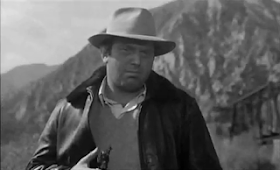 |
| Theodore Bikel in The Defiant Ones |
On Tuesday, July 21, actor and activist Theodore Bikle died at the age of 91 from natural causes. While he may not be a household name, he has had a consistent career both as an actor and a folk singer, releasing albums such as "A Folksinger's Choice." Beyond acting, he was a man whose activism allowed him to play at various important rallies and made him a delegate at the 1968 Democratic Convention. His work on film was also full of memorable roles, including an Oscar nomination for The Defiant Ones. He was claimed to have been able to play diverse cultures. He leaves behind an impressive body of work that you likely will recognize him in, even if you don't know the name.
Bikel was born in Vienna, Austria on May 2, 1924. He began acting in his teenage years and helped to find the major Israeli theater company called Cameri Theater. He considered his technique to be more intense than method acting. He moved to London, England in 1945 to study at the Royal Academy of Dramatic Art. Upon being assigned to the play A Streetcar Named Desire, he recommended his friend Laurence Olivier for the lead role. When he had to back out, Bikel played opposite Vivian Leigh. He would move to America in 1954. He claimed to have taken on the various roles so that acting never got stale. Just from his various TV roles, he played different races such as Armenian, Polish, Bulgarian, Italian and most notably Russian on Star Trek: The Next Generation.
It wasn't long until Bikle began his filmography. His first appearance was as a German officer in director John Huston's classic The African Queen. He would go on to appear in Moulin Rouge (1952), The Pride and the Passion, and several others. In 1958, he received his Oscar nomination for Best Supporting Actor for The Defiant Ones, of which he co-starred alongside Tony Curtis and Sidney Poitier. It was a film that explored racism in the south after two slaves escape and a party goes after them.
While he kept busy with film roles, he also continued to work in theater. He made his premiere in 1955 on Broadway with Tonight in Samarkind. He later received a Tony nomination for his work in The Rope Dancers. He would also star as Captain von Trapp in The Sound of Music; a role that he didn't like due to his limited singing range. It is because of Bikel's complaints that song writers Rodgers and Hammerstein wrote "Edelweiss," which was partially inspired by his folk singing career.
While Bikel never won an Oscar, he did appear in the Best Picture winner My Fair Lady as Zoltan Karpathy. He was a Hungarian linguist who tested protagonist Eliza Doolittle (Audrey Hepburn) to see if she was royalty. His role was rather minimal, but served as an important plot point in the movie. Among his later film achievements was a role in The Russians Are Coming The Russians Are Coming and the Frank Zappa film 200 Motels. He also screen tested for the role of Auric Goldfinger in the James Bond film Goldfinger.
Then there was the work that he was likely best known for: folksinging. He began recording songs in 1955 that focused on Jewish folk songs and tunes from Russia. He sung in 21 different languages, including Yiddish, Hebrew, German, and medieval Spanish. One of his early albums was "Israeli Folk Songs." In total, he released 38 albums. He was an early advocate for Bob Dylan's work. He also helped to find the Newport Folk Festival alongside Pete Seeger, Oscar Brand, and George Wein. He would often perform duets with Judy Collins. In an interview, he claimed that he became a folk singer because it was the only answer to the chaos we have.
As a result, he was also very politically active. He helped to find Actors Federal Credit Union in 1962. He also president of Actor's Equity from 1977-1982 and later The Associated Actors and Artists of America starting in 1988. While working on The Sound of Music, Bikel was also a strong campaigner for Presidential candidate John F. Kennedy. This was controversial because the press thought it was unbecoming for an actor to be political. This stopped when a limousine picked him up one night from a show and he was with Eleanor Roosevelt. President Jimmy Carter elected him to the National Counsel of the Arts in 1977, which he ran for six years. He also a member of Mensa.
So while Theodore Bikel may not be a household name, he has had quite an impact on our cultural landscape Whether it is in film or theater, where he inspired on of The Sound of Music's most iconic songs; or with his folksinging as he helped Bob Dylan and started The Newport Folk Festival, his work continues to be felt. He may not be exclusively known as an actor, but because of his activism, the world is a little bit of a better place and his contributions continue to impact various facets of entertainment. He definitely will be missed but never forgotten.
I saw him in My Side of the Mountain and I think that role was one where he was perfectly cast.
ReplyDelete